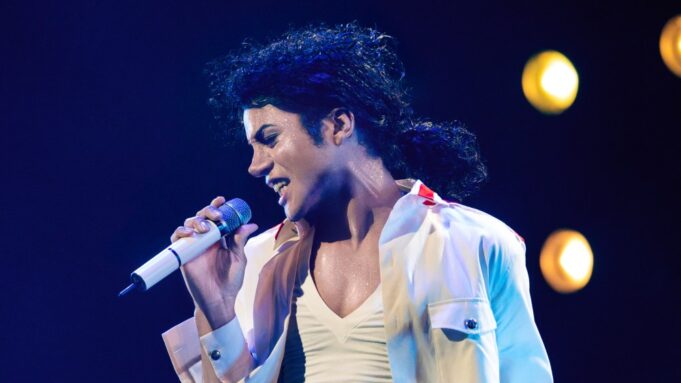Since January, the Michael Jackson biopic “Michael” has released a series of announcements of the film’s cast, including recent Oscar nominee Colman Domingo as Jackson’s father, Joe, Nia Long as Jackson’s mother, Katherine, and Miles Teller as John Branca, Jackson’s attorney and the co-executor of his estate. Each press release includes the same description of the film, promising a “riveting and honest portrayal of the brilliant yet complicated man” that will include both Jackson’s “undeniable creative genius” and his “human side and personal struggles.”
There is one significant aspect of Jackson’s life, however, that will make that promise practically impossible to fulfill: The multiple allegations that the King of Pop leveraged his global fame to groom prepubescent boys into a sexual relationship.
According to a report by Puck News, which Variety has confirmed, director Antoine Fuqua, producer Graham King and screenwriter John Logan contend with those allegations in their film. But Jackson always denied them — including during his monthslong criminal trial in 2005 for child molestation and intoxicating a minor, for which he was acquitted. His family and estate have maintained that position following Jackson’s death in 2009. For them, the only honest portrayal of the allegations is one asserting Jackson’s innocence.
Even for a musical biopic — which must secure the rights to the music of whomever it’s depicting, necessitating a partnership with the subject or their estate — “Michael” is unusually entangled with the Jackson organization. Branca and co-executor John McClain are producers of the film and Jackson is played as an adult by his nephew Jaafar Jackson. According to a source close to the production, at least one other member of Jackson’s family is on the set every day.
A spokesperson for the film tells Variety, however, that the estate “put their trust in Graham King, stepping out of the creative process.”
In a separate statement to Variety, King says he “went into this project with an open-mind and spent years researching Michael Jackson’s life and work—from his artistry to his public and private struggles, to his humanitarian efforts.”
“Michael’s life was complicated,” King continues. “As a filmmaker, I look to humanize but not sanitize and present the most compelling, unbiased story I can capture in a single feature film and let the audience decide how they feel after watching it. Michael clearly remains an impactful, culturally relevant artist with a life and legacy worth exploring.”
King’s assurance of an “unbiased” film does not hold water with filmmaker Dan Reed, director of the 2019 documentary series “Leaving Neverland,” which chronicles in detail the allegations by Wade Robson and James Safechuck that Jackson maintained separate, yearslong sexual relationships with them as children, starting when Safechuck was 10, and Robson was 7. Reed read a draft of the “Michael” screenplay, which he calls “startlingly disingenuous” for making a point to discredit Robson and Safechuck’s contention that Jackson was a pedophile.

Wade Robson and James Safechuck in “Leaving Neverland.”
Courtesy of HBO
“Jackson is only ever seen caring for children with childhood cancer, or dancing with a little girl in a wheelchair, or tucking up multiple little boys, mostly his nephews, at sleepovers,” he says. “It feels like the creators of the movie have been stuck in a room with John Branca and just told what to write.”
Screenplays can change significantly during a production. But “Michael” faces scrutiny no matter how it depicts Jackson’s behavior around children. In 2013 and 2014, Robson and Safechuck sued Jackson’s companies, now governed by his estate, for neglecting to protect them from Jackson’s alleged abuse; after see-sawing through the legal system for a decade, a California appeals court ruled in 2023 that the suits must go to trial. The cases were subsequently combined in February; Robson and Safechuck’s attorney, John Carpenter, thinks delays by the Jackson estate’s legal team will likely push the trial past the scheduled April 2025 release of “Michael.” “It might make it more difficult to select a jury,” he says. “But ultimately, I think the evidence is so strong that I’m not worried about it.”
That cuts both ways: A trial before the film’s release could depress ticket sales, and with a roughly $155 million budget, “Michael” would need to be one of the highest grossing musical biopics of all time to clear a profit in theaters.
It would also put more pressure on the movie’s cast and crew for appearing to take a side on Jackson’s innocence. “There’s too much of a stink — too much evidence, too many allegations — for anyone backing this narrative in the movie to have a clear conscience,” Reed says.
At least two members of the cast see it differently. At the Vanity Fair post-Oscars party, Variety asked Teller about how the Jackson allegations affected his decision to join “Michael.”
“Before I choose any role, I consider everything about it,” the actor said. “Regardless of what your opinion may be, Michael is one of the greatest to ever do it, if not the greatest. He deserves a movie to be made. I’m excited to be a part of it.”
Domingo struck a similar chord when answering the same question at the SXSW premiere of his film “Sing Sing.”
“I just don’t think that’s my job, to judge,” he says. “As an artist, my job is to find humanity in all people — people who have been villainized, people who have been victimized. Whether you’re talking about a Michael Jackson film, about ‘The Color Purple,’ about Bayard Rustin, I have a history of engaging with things that are more complicated to find the humanity in people. Everything’s not black and white.”
Marc Malkin contributed to this story.
From Variety US































